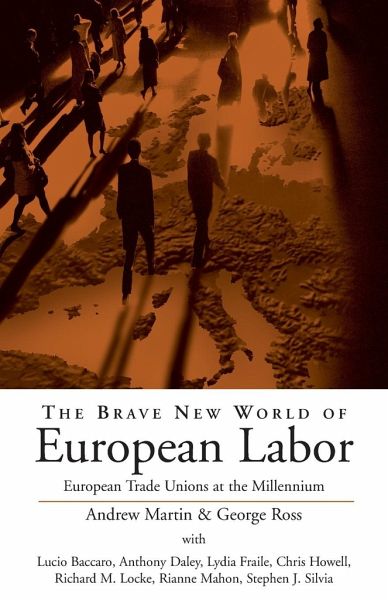
The Brave New World of European Labor
European Trade Unions at the Millennium
Herausgeber: Martin, Andrew; Ross, George
Versandkostenfrei!
Versandfertig in 1-2 Wochen
41,99 €
inkl. MwSt.

PAYBACK Punkte
21 °P sammeln!
European union movements played a central role in promoting a "Europeanmodel of society", a humane industrial relations system, high labor standards, generous welfare states, and collective political representation which reached its pinnacle in the post-World War II era. The recent shift to lower growth, rising unemployment, renewed European integration, neo-liberalism, and globalization has challenged this "European Model" and the unions' place in it. These essays, written by some of the leading scholars in the field, examine responses of six major European union movements to the dramatic cha...
European union movements played a central role in promoting a "Europeanmodel of society", a humane industrial relations system, high labor standards, generous welfare states, and collective political representation which reached its pinnacle in the post-World War II era. The recent shift to lower growth, rising unemployment, renewed European integration, neo-liberalism, and globalization has challenged this "European Model" and the unions' place in it. These essays, written by some of the leading scholars in the field, examine responses of six major European union movements to the dramatic changes in economic and political conditions in the last two decades. They are the result of a group research effort and are based on a common framework which lends it quite an exceptional coherence.




![Annual Report of the Bureau of Labor Statistics of the State of North Carolina [serial]; 1894 Cover Annual Report of the Bureau of Labor Statistics of the State of North Carolina [serial]; 1894](https://bilder.buecher.de/produkte/65/65582/65582016n.jpg)
![Annual Report of the Department of Labor and Printing of the State of North Carolina [serial]; 1912 Cover Annual Report of the Department of Labor and Printing of the State of North Carolina [serial]; 1912](https://bilder.buecher.de/produkte/66/66170/66170521n.jpg)

![Annual Report of the Bureau of Labor Statistics of the State of North Carolina [serial]; 1896 Cover Annual Report of the Bureau of Labor Statistics of the State of North Carolina [serial]; 1896](https://bilder.buecher.de/produkte/65/65537/65537036n.jpg)

![Annual Report of the Department of Labor and Printing of the State of North Carolina [serial]; 1910 Cover Annual Report of the Department of Labor and Printing of the State of North Carolina [serial]; 1910](https://bilder.buecher.de/produkte/65/65581/65581067n.jpg)
![Annual Report of the Department of Labor and Printing of the State of North Carolina [serial]; 1914 Cover Annual Report of the Department of Labor and Printing of the State of North Carolina [serial]; 1914](https://bilder.buecher.de/produkte/65/65626/65626343n.jpg)

![Toronto Labor Directory and Union Label Hand-book [microform]: Official Directory of the Toronto Trades and Labor Council Cover Toronto Labor Directory and Union Label Hand-book [microform]: Official Directory of the Toronto Trades and Labor Council](https://bilder.buecher.de/produkte/66/66195/66195116n.jpg)